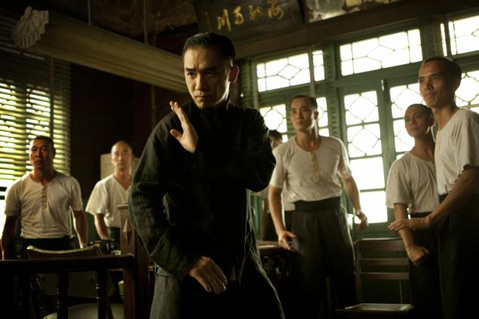Review: The Grandmaster
Tony Leung, Zhang Ziyi, and Chang Chen star in a film written by Zou Jingzhi, Xu Haofen, and Wong Kar-wai and directed by Wong Kar-wai.

Fans of the artfully romantic, atmospheric cinematic baths that are Wong Kar-wai’s best films — especially the dreamy, fragmented, and über-sensuous In the Mood for Love — may have a head-scratching disconnect moment upon hearing that his latest, The Grandmaster, is a martial arts film. Has he gone over to the dark, B-movie side? Not exactly, and on more than one count.
Principally, the famed Hong Kong-based director, with no small help from poetic cinematographer Philippe Le Sourd, brings his signature style to this mini-epic tale of previously segregated north and south Chinese Kung Fu schools coming together and entering general, western-world attention from before WWII through the early 1950s. From the earliest fight scene, in slo-mo in the rain, through to the train platform fight scene late in the film, we get the sense that Wong’s interest in “action” movie dynamics is more related to dance and cinematic kinetics than pugilistic “action movie” chops.
On another count, the very world of Kung Fu, in its essential, historic form, is much more about “precision” and a “code of conduct” than the cheesier, bone-crunching and drive-in theater-ready flicks suggest. Tony Leung Chiu Wai, Wong’s recurring hero of choice, is again in fine, coolly magnetic form as the martial arts guru Ip Man, from the southern “Wing Chun” school of Kung Fu, who fights the female Gong Er (the calmly stunning Zhang Ziyi) — aka “64 Hands” — the offspring of a northern grandmaster. She is the tragic almost-love interest in the tale, and Wong’s expertise in sublimated sexual dynamics beneath lustrous surfaces warms up a few scenes between our fated protagonists.
The Grandmaster tells the tale of Ip Man’s travails and triumphs, from the late ’30s through the punishing era of Japanese occupation, and then his politically alienated life in Hong Kong as Communist China cuts its ties there. But there is a grander underlying story afoot here, about the transition from the older order of Chinese life, the rude awakening and tragedies of modern warfare imposed by the Japanese, and fleeting glimpses of life beyond the ’50s. As memorable as many of its parts are, the film’s whole feels a bit confused. Nonetheless, Wong once again demonstrates that “romanticism” doesn’t have to be a dirty or cheapening word at the movies.



